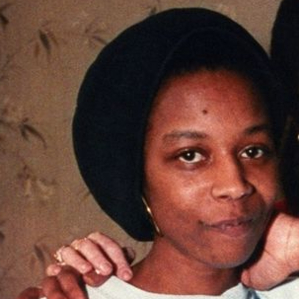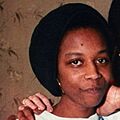June and Jennifer Gibbons facts for kids
Quick facts for kids
June Gibbons
|
|
|---|---|
| Born | 11 April 1963 British Forces Aden, Yemen
|
| Nationality | British |
| Occupation | Fiction author |
| Parent(s) | Gloria and Aubrey Gibbons |
|
Jennifer Gibbons
|
|
|---|---|
 |
|
| Born | 11 April 1963 British Forces Aden, Yemen
|
| Died | 9 March 1993 (aged 29) |
| Nationality | British |
| Occupation | Fiction author |
| Parent(s) | Gloria and Aubrey Gibbons |
June Gibbons (born April 11, 1963) and Jennifer Gibbons (April 11, 1963 – March 9, 1993) were identical twin sisters who grew up in Wales. They became known as "The Silent Twins" because they mostly communicated only with each other. They loved writing stories and novels. Both sisters spent eleven years at Broadmoor Hospital, a special hospital for mental health.
Contents
Their Early Years
June and Jennifer were the daughters of Gloria and Aubrey Gibbons. Their parents were immigrants from the Caribbean island of Barbados. The family moved to the United Kingdom in the early 1960s. This was part of a large movement of people known as the Windrush generation.
Their mother, Gloria, was a housewife. Their father, Aubrey, worked as a technician for the Royal Air Force. The twins had three other siblings: Greta, David, and Rosie.
Growing Up and Moving
The twins were born on April 11, 1963, in a military hospital in Aden, Yemen. Their father was stationed there at the time. The family soon moved back to England. In 1974, they moved to Haverfordwest, Wales.
The twin sisters were very close and rarely separated. They spoke a very fast version of Bajan Creole, which is a language from Barbados. It was hard for other people to understand them.
Challenges at School
The Gibbons children were the only Black children in their community. June and Jennifer often faced difficulties at school. This was very upsetting for the twins. School staff even let them leave early each day to avoid bullying.
Their unique way of speaking became even more private. Soon, no one else could understand them. This special language between just the two of them is called idioglossia. It's also a type of cryptophasia, where twins communicate in a secret way. They often did things at the same time, mirroring each other. The twins became very quiet and eventually spoke only to each other and their younger sister, Rose.
School staff noticed their quiet behavior in 1974. They told a child psychologist. The twins saw many therapists, but they could not get them to talk to others. They were even sent to separate boarding schools to try and help them communicate. However, the sisters became very withdrawn and unresponsive when they were apart.
Their Creative World
When June and Jennifer were reunited, they spent several years mostly in their bedroom. They played elaborate games with dolls. They created many plays and stories, like a soap opera. They even recorded some of them to give to their sister, Rose.
In 1979, they received gift diaries for Christmas. This inspired them to start writing. They took a mail order course in creative writing. Both sisters kept detailed diaries and wrote many stories, poems, and novels.
Published Works
June wrote a novel called The Pepsi-Cola Addict. The twins used their unemployment benefits to pay a vanity press to publish it. A vanity press is a publisher that charges authors to print their books.
For a long time, The Pepsi-Cola Addict was hard to find. It was only in a few libraries. But in October 2022, it was republished. Jennifer also wrote novels, including The Pugilist. In this story, a doctor takes his family dog's heart for a transplant to save his child. The dog's spirit then gets revenge. Jennifer also wrote Discomania and The Taxi-Driver's Son. June Gibbons is sometimes called an outsider writer. This means her work is unique and outside traditional art forms.
Time in the Hospital
When they were older teenagers, the twins were admitted to Broadmoor Hospital. This is a high-security mental health hospital. They were ordered to stay there for an unknown period under a law about mental health care. They remained at Broadmoor for eleven years.
June later felt their long stay was because they didn't speak. She said, "Young people who commit crimes often get two years in prison... We got twelve years of hell because we didn't speak... We lost hope, really." She even wrote a letter to the Queen asking for help.
Life at Broadmoor
At the hospital, they were given high doses of medications. This made it hard for them to focus. Jennifer developed a condition that caused involuntary movements. Their medications were later adjusted. This allowed them to continue writing in their detailed diaries. They also joined the hospital choir. However, they lost much of their interest in creative writing.
Their story became well-known because of newspaper articles by journalist Marjorie Wallace. She later wrote a book about them called The Silent Twins. It was published in 1986.
Jennifer's Passing
According to Marjorie Wallace, the sisters had a special agreement. If one of them died, the other would start speaking and live a normal life. In March 1993, the twins were moved from Broadmoor to a different clinic.
When they arrived, Jennifer could not be woken up. She was taken to the hospital and died soon after. The cause of death was acute myocarditis, which is a sudden inflammation of the heart. Jennifer was buried in St Martin's Cemetery in Haverfordwest, Pembrokeshire, Wales.
June's Life After
After Jennifer's death, June gave interviews to magazines. By 2008, she was living a quiet and independent life near her parents in West Wales. She was no longer under psychiatric care. She had been accepted by her community and wanted to move on from the past.
In 2016, June's sister Greta shared that the family was very upset by the twins' time in the hospital. She felt Broadmoor had ruined their lives and didn't take care of Jennifer's health. Greta wanted to sue the hospital, but their parents, Aubrey and Gloria, decided not to. They felt it would not bring Jennifer back.
Their Story in Media
The twins' story has been told in various forms of media.
- A 1986 television drama called The Silent Twins was shown on BBC2.
- An Inside Story documentary, Silent Twin – Without My Shadow, aired on BBC1 in 1994.
- A play based on Wallace's book, called Speechless, opened in London in 2011.
- The 1998 Manic Street Preachers song "Tsunami" was inspired by their story.
- A film about the twins, also titled The Silent Twins, was released in 2022. It stars Letitia Wright and Tamara Lawrance. The film is based on Marjorie Wallace's 1986 book.
Images for kids
See also
 In Spanish: June y Jennifer Gibbons para niños
In Spanish: June y Jennifer Gibbons para niños
- Ursula and Sabina Eriksson
- Poto and Cabengo
 | Isaac Myers |
 | D. Hamilton Jackson |
 | A. Philip Randolph |


